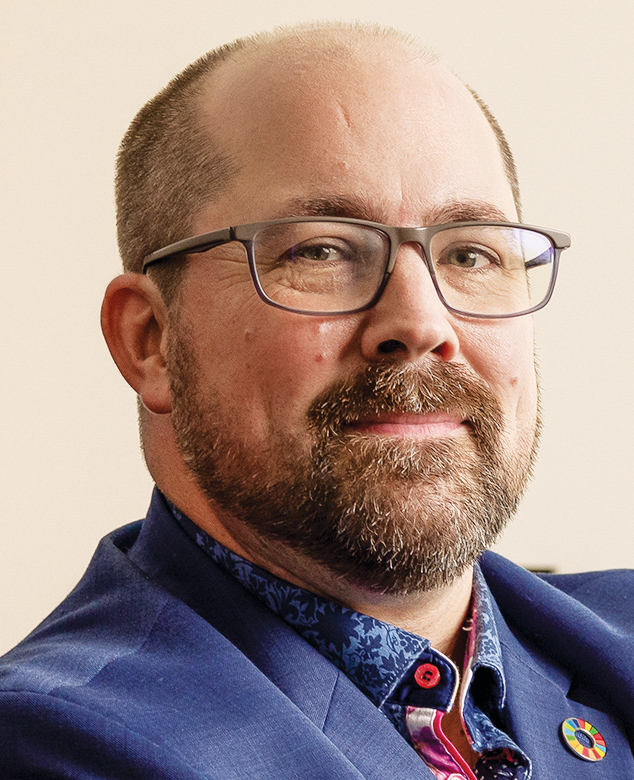Truth before reconciliation; humility before truth
 |
| Dr Joshua Greggain |
Undoubtedly, we have all had “where were you” moments when life-changing and historical events happened. I remember exactly where I was when Princess Diana died, and when Mother Teresa passed 6 days later. I recall, in vivid detail, the unbelievable events of 11 September 2001, and more recently when news broke about finding the remains of 215 Indigenous children on the grounds of the Kamloops residential school.
This one hit closer to home. It was 27 May 2021, and it was a moment that carried so many levels of devastation: the initial shock, and then comprehending how something like this could happen in Canada; the sadness that for years these stories went untold; and the personal connection that this discovery lay within a community I knew. This was a place where some of my patients had been students, and others were relatives of these children. This was more than just a heartbreaking national news story; this was personal. It weighed heavily on my heart then and continues to do so today.
For 12 years, I had the privilege of working alongside the Boston Bar First Nation in an Indigenous-led primary care clinic about 200 km from Kamloops. During that time, I heard stories, understood truths, and learned teachings from my Indigenous patients that will forever hold space my heart. I thought I understood many of my patients’ stories—the impact of generational trauma and the subsequent health consequences. I tried to practise what Maya Angelou articulated: “Do the best you can until you know better. Then when you know better, do better.” And with the discovery of those children and the thousands since, I knew I could do better. I believe we all can.
I have tried to change my interactions and my questions in my clinical practice to acknowledge the truths of what I now know and understand. I appreciate that without speaking truth there will not be reconciliation. That we as a profession need to acknowledge the truths of the Truth and Reconciliation Commission of Canada’s reports and the In Plain Sight report to reconcile our country, reconcile our communities, and reconcile with our patients. I didn’t attend a residential school, but that doesn’t mean I can’t do better than those before me who looked like me, who shared my heritage, or who shared a faith or belief system. I can do better. It starts with changing the language I use from asking “What is wrong?” to asking “What happened?” From asking “Where are you from?” to saying “Tell me about your community and who your relatives are.” It is an ongoing learning process, and every day I try to do better. I will continue to seek humility before truth and understand that truth needs to come before reconciliation.
The 30th of September is the National Day for Truth and Reconciliation, also known as Orange Shirt Day, an Indigenous-led grassroots commemorative day intended to raise awareness about the individual, family, and community intergenerational impacts of residential schools. It promotes the tenet “Every child matters.” The orange shirt symbolizes the stripping away of culture, freedom, and self-esteem that Indigenous children experienced across generations.
I will wear my orange shirt and attend a local event to commemorate the day. I encourage you to do the same. I ask you to consider reviewing the health-related Calls to Action (#18–#24) from the Truth and Reconciliation Commission of Canada [Box], whether for the first time or the hundredth. More than anything else, I ask you to consider how we, individually and as a medical culture and community, can seek humility, because I believe that if we can reveal our collective humility, we can find a path to the truth. It is only then that we can move forward toward reconciliation.
—Joshua Greggain, MD
Doctors of BC President
BOX. Calls to Action #18–#24. Truth and Reconciliation Commission of Canada. 2015.
https://ehprnh2mwo3.exactdn.com/wp-content/uploads/2021/01/Calls_to_Action_English2.pdf
Truth and Reconciliation Commission of Canada Calls to Action #18–#24 (health)
18. We call upon the federal, provincial, territorial, and Aboriginal governments to acknowledge that the current state of Aboriginal health in Canada is a direct result of previous Canadian government policies, including residential schools, and to recognize and implement the health-care rights of Aboriginal people as identified in international law, constitutional law, and under the Treaties.
19. We call upon the federal government, in consultation with Aboriginal peoples, to establish measurable goals to identify and close the gaps in health outcomes between Aboriginal and non-Aboriginal communities, and to publish annual progress reports and assess long term trends. Such efforts would focus on indicators such as: infant mortality, maternal health, suicide, mental health, addictions, life expectancy, birth rates, infant and child health issues, chronic diseases, illness and injury incidence, and the availability of appropriate health services.
20. In order to address the jurisdictional disputes concerning Aboriginal people who do not reside on reserves, we call upon the federal government to recognize, respect, and address the distinct health needs of the Métis, Inuit, and off-reserve Aboriginal peoples.
21. We call upon the federal government to provide sustainable funding for existing and new Aboriginal healing centres to address the physical, mental, emotional, and spiritual harms caused by residential schools, and to ensure that the funding of healing centres in Nunavut and the Northwest Territories is a priority.
22. We call upon those who can effect change within the Canadian health-care system to recognize the value of Aboriginal healing practices and use them in the treatment of Aboriginal patients in collaboration with Aboriginal healers and Elders where requested by Aboriginal patients
23. We call upon all levels of government to:
i. Increase the number of Aboriginal professionals working in the health-care field.
ii. Ensure the retention of Aboriginal health-care providers in Aboriginal communities.
iii. Provide cultural competency training for all healthcare professionals.
24. We call upon medical and nursing schools in Canada to require all students to take a course dealing with Aboriginal health issues, including the history and legacy of residential schools, the United Nations Declaration on the Rights of Indigenous Peoples, Treaties and Aboriginal rights, and Indigenous teachings and practices. This will require skills-based training in intercultural competency, conflict resolution, human rights, and anti-racism.
hidden
 |
| This work is licensed under a Creative Commons Attribution-NonCommercial-NoDerivatives 4.0 International License. |

